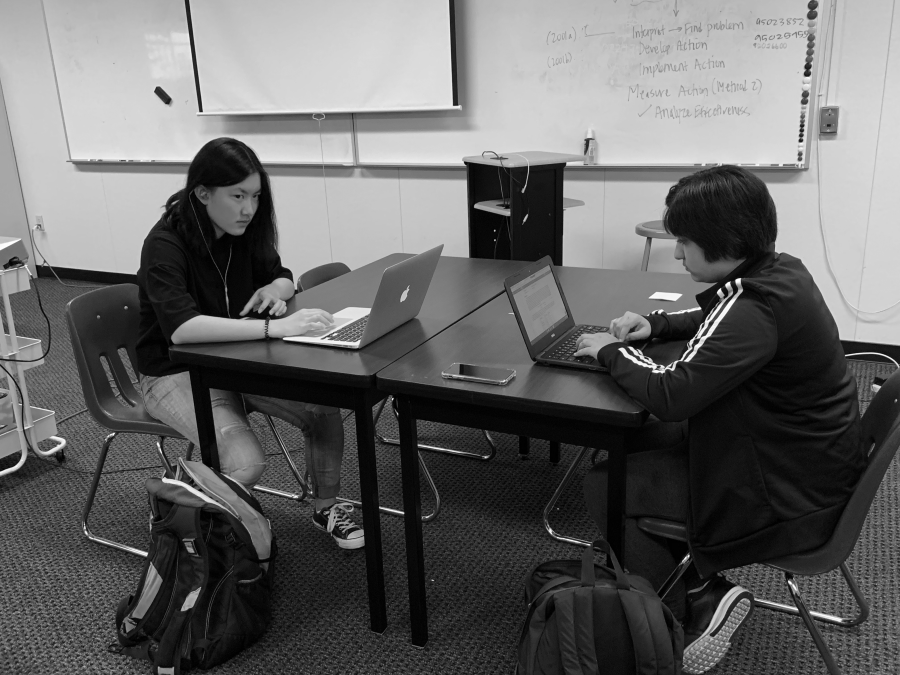As the bell rings, signifying the end of another school day, junior Katie Cheng walks through the masses of students leaving class. Every Tuesday and Thursday, instead of heading home or to sports practice, Cheng makes her way to her eighth period Advanced Authentic Research class.
Cheng is one of many Paly students who take an additional class during eighth period after the regular school day is over. Students can choose to take these classes on Infinite Campus when selecting their schedule for the following year.
Paly offers several eighth period classes, including AAR, Advanced Problem Solving, Stage Tech and Jazz Ensemble. Cheng said these classes help students pursue unique interests by facilitating a student-driven learning experience.
“AAR is a research class where you choose a project to work on for the year,” Cheng said. “I love that it’s so independent and that I get to spend an entire year working on a complex research question that I’m really passionate about.”
Instead of learning out of textbooks with a guided curriculum, students in AAR use a project-based learning model to explore their own interests.
“We focus on our research projects, which is ultimately how we learn instead of just reading out of a textbook,” junior Avantika Singh, who also takes eighth period AAR, said.
AAR teacher Hilary McDaniel said being able to offer the course during eighth period is one of its major selling points. Because it is not attached to a set curriculum, the class gives students additional flexibility.
“AAR is a way for students to augment their education in a field that they are interested in,” McDaniel said.
Advanced Problem Solving is another course that students have the option of taking during eighth period. Over the course of the year, students learn alternative methods of solving complex math problems, skills they often take with them to math competitions.
Junior Ishan Tripathi, a student in Advanced Problem Solving, said the class is different from traditional classes taken during the school day.
“(Advanced Problem Solving) is more relaxed and has a lower pressure environment,” Tripathi said.
Tripathi also said the nature of the coursework is more independent than other classes.
“The class is highly student-driven because we pick out our own problems to submit as homework,” Tripathi said.
Cheng said this is also the case in AAR. The project-based learning model of AAR is flexible, allowing students to conduct varying degrees of research.
“You can really make the class as difficult as you want, depending on how in depth you want to go for your project,” Cheng said.
However, taking an eighth period class after school comes at a cost, according to Cheng.
“It’s really difficult for someone with after school commitments, such as athletics, to take an eighth period class because of practices and games,” Cheng said.
According to Singh, the extra class can also interfere with time otherwise spent studying for regular classes.
“When all of my friends are leaving school early to go home and use their time to study for their next test, it makes me feel very unmotivated,” Singh said.
Although taking an eighth period class does require extra work, many students consider the ability to balance a larger workload to be one of the most important skills that they gain from the experience.
“My favorite part about taking an eighth period class is that it teaches you to be disciplined,” Cheng said. “Because you don’t meet for as many hours, you have to spend time at home doing what other students do during their class period.”
Eighth period classes also cultivate a learning environment in which everyone is engaged and excited to take the course, McDaniel said.
“If we didn’t offer eighth period (classes), students would be missing out on a chance to pursue their passions,” McDaniel said. “Students are choosing to take this class because they are really interested in a particular topic.”
McDaniel said this shared experience creates a tight-knit classroom community that bonds not necessarily over shared interests, but a common drive that compels students to seek out knowledge even when school is out for the day.
“I get an interesting, diverse group of students, and we bond,” McDaniel said. “It is the end of the day and we are all tired, but we are here and we are going to do this together.”
Although eighth period is one of the lesser known elements of the Paly schedule, McDaniel believes it is among the most important. Instead of being another class to get through, eighth period classes provide an opportunity for students to explore their individual interests unfettered by an often inflexible curriculum.
“I’m so glad that we offer eighth period, because I’m not sure that students have the ability to (explore their passions) during the (typical school) day,” McDaniel said. “So I do think that it is very important that we offer eighth period, and I think it is important that we continue to do so.”


